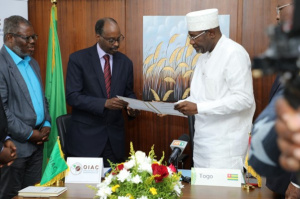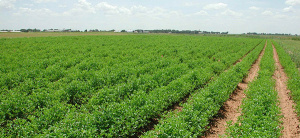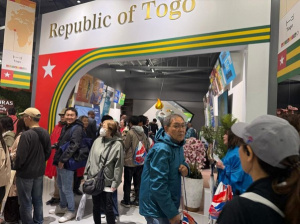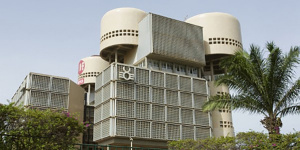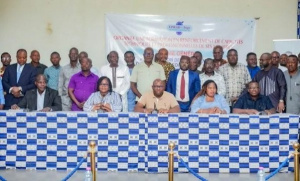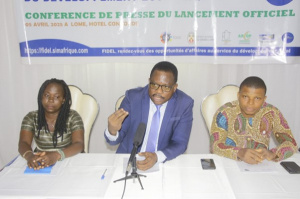Togo First
Togo Commits to IACO Agreement for Stronger Coffee Sector
Togo has officially joined the Inter-African Coffee Organization (IACO) by submitting its Instrument of Acceptance for the 2020 Agreement in early April. This move legally commits Togo to the agreement to strengthen cooperation in Africa's coffee sector. Togo had initially agreed to the terms in May 2023.
The Instrument of Acceptance is a key step that confirms Togo's commitment to abide by the agreement's rules. These rules are designed to promote sustainable governance of African coffee.
At the ceremony in Ivory Coast, IACO Secretary General Solomon Rutega praised Togo's decision, calling it a strong commitment to African control over its agricultural resources. Rutega noted that Togo's involvement in coffee sector discussions shows its political will to boost agricultural production.
Enselme Gouthon, Secretary General of the Coordination Committee for the Coffee and Cocoa Sectors (CCFCC), sees Togo's involvement in the coffee sector as strategic. The government aims to produce 50,000 tonnes of coffee annually by 2030, nearly doubling current levels.
Between 2013 and 2023, Togo’s coffee output rose from 10,950 tonnes to 27,336 tonnes.
This article was initially published in French by Esaie Edoh
Edited in English by Ange Jason Quenum
African Union Appoints Faure Gnassingbé as Mediator for DRC-Rwanda Conflict
The African Union (AU) officially appointed Togolese President Faure Gnassingbé as mediator in the conflict ravaging eastern Democratic Republic of Congo (DRC). He replaces Angolan President João Lourenço, who withdrew from the mission last month.
The AU confirmed the transition in a press release issued over the weekend.
Togo’s Minister of Foreign Affairs, Robert Dussey, relayed the news on April 13, 2025, on X, formerly Twitter.
The AU aims to revive stalled diplomatic efforts in the Great Lakes region, still facing armed clashes, persistent tensions, and a dire humanitarian crisis.
Gnassingbé’s appointment comes amid rising mistrust between Kinshasa and Kigali. The DRC accuses Rwanda of supporting the M23 rebel movement, a claim Rwanda denies. Military advances by M23 have worsened the situation, with the group seizing strategic areas near Goma and Bukavu through swift operations that overwhelmed Congolese forces.
Diplomatic attempts to resolve the crisis have so far failed. In late March, Congolese government representatives and M23 leaders met in Doha under Qatar’s mediation to initiate dialogue. This meeting followed a bilateral discussion in Doha between DRC President Félix Tshisekedi and Rwandan President Paul Kagame.
The AU appointed Gnassingbé, who has a proven track record in mediation. In recent years, the Togolese leader has played key roles in resolving political crises in West Africa, including negotiations in Mali, Niger, and Burkina Faso during disputes with ECOWAS.
However, his task will be daunting. The eastern DRC conflict is driven by complex factors such as ethnic rivalries, economic interests tied to mining resources, foreign interference, and widespread mistrust of Congolese institutions.
This article was initially published in French by Esaïe Edoh
Edited in English by Jason Ange Quenum
Togo: 78% of Farmers Have No Land Security
The first phase of Togo’s 5th National Agricultural Census (RNA-5) counted 677,692 farming households nationwide, and 85% of them are in rural areas. Among these households, 78% have no land security, exposing them to persistent structural fragility.
Additionally, 57% of households cultivate areas of two hectares or less, and only 6.24% use tractors.
These preliminary results, presented last week to local authorities in prefectures such as Lakes and Agoé-Nyivé, were covered by the Togolese Press Agency (ATOP). The Ministry of Agriculture conducted the census to establish a reliable statistical system for better agricultural policy planning.
The government views this census as a strategic tool aligned with Roadmap 2025 and critical issues like food security, gender equality, and climate resilience.
Low Mechanization and Irrigation
The data highlights that agriculture in Togo relies heavily on animal traction (33%), while irrigation remains minimal at just 4%, mostly manual. Experts say these figures confirm the urgent need for modernization, through mechanization and land security reforms.
Livestock data shows poultry dominates at 50%, followed by goats at 21%, and cattle at just 7%.
The second phase of RNA-5 began on April 7 and will focus on food production, livestock, fishing, and arboriculture. This phase aims to provide a complete overview
to guide agricultural investments and strengthen rural value chains.
This article was initially published in French by Ayi Renaud Dossavi
Edited in English by Ange Jason Quenum
Togo Shortlists 25 Startups for Final Phase of OIF Digital Training Program
Togo has selected 25 startups for the final stage of the "D-CLIC, Digital Training with the OIF". Picked out of more than 100 applicants, the 25 chosen will participate in a week-long exhibition and presentation event in Lomé from April 21 to 26. The Organisation internationale de la Francophonie (OIF) initiated the program, which is implemented locally by the CUBE incubator.
The program will culminate in the selection of 10 winners who will join an advanced support initiative at the UniPod-Togo hub, located at the University of Lomé. These startups represent diverse sectors within Togo’s tech ecosystem, including digital health, agro-business, e-commerce, education, artificial intelligence, cosmetics, and fashion design.
Highlighted projects include Koulmed, which facilitates homecare access; Deremapack, a producer of biodegradable packaging; and ThinkFlow, an AI-powered study assistant. These innovations showcase Togo’s growing capacity to develop market-ready solutions with significant potential.
Supported by partners such as UNDP, GIZ, ANVT, ISMB-Kara, and IYBA Seed, the program aligns with Togo’s national strategy to advance digital development and promote youth employment. Interested investors can register online to support these promising startups. The grand finale will take place on April 26 at the University of Lomé.
This article was initially published in French by Ayi Renaud Dossavi
Edited in English by Ange Jason Quenum
Togo Showcases Culture and Economy at Osaka World Expo
From April 13 to October 13, 2025, Togo will promote its culture and economic potential in Japan at the Osaka World Expo.
The Togolese pavilion, already open, showcases the country’s handicrafts, biodiversity, royal traditions, and iconic landscapes. The exhibition also emphasizes Togo’s ongoing economic transformation, focusing on infrastructure development, digital technology, sustainable agriculture, and renewable energy.
Participating in the event is part of the government’s broader economic diplomacy strategy. By promoting the country to foreign investors and technical partners, Togo aims to strengthen its international presence. A special day dedicated to Togo is scheduled for August 19, 2025, marking a key moment to advance its economic and cultural ambitions amid growing regional competition.
This article was initially published in French by Esaïe Edoh
Edited in English by Ola Schad Akinocho
West Africa: BOAD Records CFA40 Billion Net Profit in 2024
The West African Development Bank (BOAD) closed the 2024 financial year with a net profit of CFA39.402 billion, against CFA36.453 billion in 2023, or 8.09% up year-on-year. The Lomé-based institution reported the performance in a press release dated April 7, 2025, after the Council of Ministers of the West African Monetary Union (WAMU) validated its accounts.
According to the source, BOAD's balance sheet total surged by 11.8%, reaching CFA3,893.5 billion compared to CFA3,482 billion in 2023. Net banking income climbed slightly to CFA114.9 billion from last year's CFA111 billion.
Several factors drove this performance, including a share capital increase of CFA554 billion, a subordinated debt issuance worth €100 million, and risk transfer mechanisms such as receivables securitization and credit insurance.
With equity standing at CFA1,390.8 billion—35.72% of its total balance sheet—BOAD maintains its reputation as a robust financial institution. Also, it kept its Investment Grade credit ratings: Baa1 from Moody’s and BBB from Fitch Ratings.
This year, BOAD said it will support several projects across the region. For example, Togo has secured CFA20 billion from the apex bank to build and operate a ministerial residence in Lomé and CFA40 billion to address energy emergencies.
This article was initially published in French by Ayi Renaud Dossavi
Edited in English by Ola Schad Akinocho
Togo: Around $14B Needed by 2050 to Fight Climate (World Bank)
Togo needs around $14 billion (around CFA8,320 billion) by 2050 to address climate change challenges. The World Bank forecast the need in a recent report on climate-resilient development trajectories. This figure highlights the immense structural challenges the West African nation faces as it grapples with the effects of global warming.
Climate Investments Demand 6.2% of GDP Annually
According to the Bretton Woods institution, Togo must allocate 6.2% of its GDP annually to climate-related investments until 2035. This substantial financial burden comes amid limited budgetary resources and ongoing fiscal consolidation efforts.
By 2050, investment needs will total $14 billion, with 40% earmarked for adaptation measures—such as coastal protection, agriculture, water management, and health—and 60% for mitigation efforts, including renewable energy, energy efficiency, and sustainable mobility.
Togo’s vulnerability to climate risks like flooding, droughts, sea-level rise, and heat waves directly threatens its economic growth, food security, infrastructure, and social stability. "Climate change is already affecting the Togolese population," the report states, citing disruptions caused by more frequent heat waves, unpredictable rainfall patterns, and worsening coastal erosion.
Private Sector Mobilization
Given the scale of financial needs, the report urges the urgent mobilization of public and private funding through innovative mechanisms such as green bonds, climate guarantees, and public-private partnerships. The private sector is called upon to play a pivotal role in energy investments and agricultural adaptation solutions.
The report also emphasizes the importance of improved governance, regulatory incentives, and cross-sectoral planning. Without coordinated action, climate change could impose lasting economic and social costs that hinder Togo’s development.
Agriculture and Climate Resilience
Agriculture contributes 40% of Togo’s GDP and employs 70% of its impoverished population. The report recommends targeted investments in climate-smart agricultural solutions to bolster resilience against heat stress, erosion, and disease. Without intervention, Togo’s agricultural output could drop by 12.3% over the next 25 years, endangering food security and rural livelihoods.
To bridge funding gaps, the World Bank recommends prioritizing low-cost, high-yield investments while relying heavily on private sector contributions. Governance reforms could enhance resource allocation efficiency. The report also suggests developing new revenue streams and improving access to climate financing instruments.
Recent initiatives reflect these recommendations. Last October, Togo adopted a Sustainable Financing Framework to attract investments aligned with its development goals. This framework identifies fourteen categories of eligible expenditures—five dedicated to climate actions and nine targeting social projects for vulnerable populations.
Additionally, the National Assembly recently passed a law on climate change that establishes a legal framework for adaptation and mitigation policies. This legislation aims to mobilize resources needed for implementing national climate strategies.
This article was initially published in French by Ayi Renaud Dossavi
Edited in English by Ange Jason Quenum
Togo: SEPHIS Foundation to Support 125 Local Women-led Businesses
The SEPHIS Foundation aims to mobilize CFA1 billion to support 125 women-led SMEs in Togo. Séphora Kodjo, Chair of the Foundation’s Board of Directors, reaffirmed this goal during a meeting with Prime Minister Victoire Tomégah-Dogbé on Friday, April 4, 2025.
Kodjo stated that various packages, ranging from five to a hundred million CFA, will be allocated through partnerships with the African Guarantee Fund and Ecobank. These funds will address key needs such as business structuring, technical assistance, and access to credit.
This initiative follows a partnership agreement signed with the Ecobank Foundation months earlier. Beyond financing, SEPHIS plans to help businesses access new markets by placing their products in supermarkets.
Active in Togo since 2018, SEPHIS supports women’s leadership through conferences, training programs, and mentorship. Charlotte Guézéré leads local efforts for the foundation. To date, SEPHIS has distributed over €2 million to women entrepreneurs across Togo, Senegal, and Côte d’Ivoire.
This article was initially published in French by Ayi Renaud Dossavi
Edited in English by Ange Jason Quenum
Togo: Customs Agents Get Fast-Track Training on Procedures and Litigation
Lomé's Authorized Customs Agents (CDA) began an intensive training session on Monday, April 7, 2025. The Union Professionnelle des Agréés en Douane du Togo (ed. note: Togo Professional Union of Customs Agents)(UPRAD-Togo) organized the three-day event.
The session focuses on "Optimizing CDA customs skills for better professional performance." It aims to review the profession's fundamentals, customs regimes, disputes, and clearance procedures.
On the opening day, UPRAD President Patrick Magnon emphasized the need for CDAs to "reduce their vulnerability" to regulatory and operational challenges.
For Koffigan Dodji Akakpo, UPRAD Secretary General, the meeting aligns with their "vision of continuously strengthening the skills of our members".
Lead trainer Col. Kpatcha Kedessim, a retired inspector, highlighted common issues: goods classification errors, declaration mistakes, and unfamiliarity with customs procedures.
The three-day program covers topics including the commissionaire's profession foundations, customs services organization, legislation, regulations, procedures, and litigation.
Togo to Host International Festival of Local Economic Development Next Month
From May 15 to 17, 2025, Lomé will host the first International Festival of Local Economic Development (FIDEL). The event is orfanized by two NGOs–Initiatives des Jeunes pour le Développement (IJD) and SIM-Afrique–and backed by the Global Entrepreneurship Network (GEN). The festival aims to mobilize local resources for the Togolese authorities.
The FIDEL will gather local officials, entrepreneurs, investors, donors, and diaspora members to strengthen local economies, attract investments, and promote public-private partnerships. "You can't discuss development without financial resources," said Pascal Agbové, IJD's Executive Director and event promoter. He added, "FIDEL provides a framework to help local authorities secure the funding needed for their projects."
The festival will feature training sessions, B2B meetings, investment presentations, and Decentralisation Night—a ceremony honoring contributors to local development. Organizers expect around 300 participants from countries such as Benin, Côte d’Ivoire, Mali, Belgium, the UK, and Canada.

